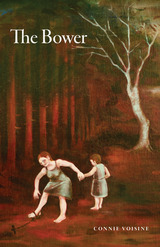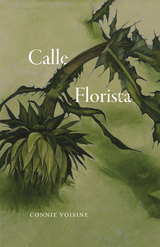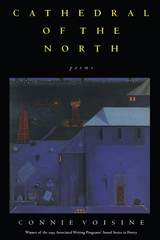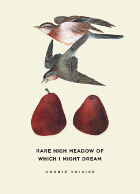4 books about Voisine, Connie

The Bower
Connie Voisine
University of Chicago Press, 2019
How can a person come to understand wars and hatreds well enough to explain them truthfully to a child? The Bower engages this timeless and thorny question through a recounting of the poet-speaker’s year in Belfast, Northern Ireland, with her young daughter. The speaker immerses herself in the history of Irish politics—including the sectarian conflict known as The Troubles—and gathers stories of a painful, divisive past from museum exhibits, newspapers, neighbors, friends, local musicians, and cabbies. Quietly meditative, brooding, and heart-wrenching, these poems place intimate moments between mother and daughter alongside images of nationalistic violence and the angers that underlie our daily interactions. A deep dive into sectarianism and forgiveness, this timely and nuanced book examines the many ways we are all implicated in the impulse to “protect our own” and asks how we manage the histories that divide us.
[more]

Calle Florista
Connie Voisine
University of Chicago Press, 2015
This World and That One
Sometimes you defy it,
I am not that, watching a stranger
cry like a dog when she thinks she’s alone
at the kitchen window, hands forgotten
under the running tap.
The curtains blow out, flap the other side of the sill.
In you one hole fills another,
stacked like cups.
You remember your hands.
Connie Voisine’s third book of poems centers on the border between the United States and Mexico, celebrating the stunning, severe desert landscape found there. This setting marks the occasion as well for Voisine to explore themes of splitting and friction in both human and political contexts. Whose space is this border, she asks, and what voice can possibly tell the story of this place?
In a wry, elegiac mode, the poems of Calle Florista take us both to the edge of our country and the edge of our faith in art and the world. This is mature work, offering us poems that oscillate between the articulation of complex, private sensibilities and the directness of a poet cracking the private self open—and making it vulnerable to the wider world.
Sometimes you defy it,
I am not that, watching a stranger
cry like a dog when she thinks she’s alone
at the kitchen window, hands forgotten
under the running tap.
The curtains blow out, flap the other side of the sill.
In you one hole fills another,
stacked like cups.
You remember your hands.
Connie Voisine’s third book of poems centers on the border between the United States and Mexico, celebrating the stunning, severe desert landscape found there. This setting marks the occasion as well for Voisine to explore themes of splitting and friction in both human and political contexts. Whose space is this border, she asks, and what voice can possibly tell the story of this place?
In a wry, elegiac mode, the poems of Calle Florista take us both to the edge of our country and the edge of our faith in art and the world. This is mature work, offering us poems that oscillate between the articulation of complex, private sensibilities and the directness of a poet cracking the private self open—and making it vulnerable to the wider world.
[more]

Cathedral Of The North
Connie Voisine
University of Pittsburgh Press, 2001
Set against a fantastic backdrop of religious imagery, myth and dreams, science fiction, and the stark realities of a northern factory town, Voisine's poems carefully detail the life of a common hero and his family.
[more]

Rare High Meadow of Which I Might Dream
Connie Voisine
University of Chicago Press, 2008
The Bird is Her Reason
There are some bodies that emerge
into desire as a god
rises from the sea, emotion and
memory hang like dripping clothes—this
want is like
entering that heated red
on the mouth of a Delacroix lion,
stalwart, always that red
which makes
my teeth ache and my skin feel
a hand that has never touched me,
the tree groaning outside becomes
a man who knocks on my bedroom window,
edge of red on gold fur,
the horse, the wild
flip of its head, the rake of claws
across its back, the unfocussed,
swallowed eye.
Rare High Meadow of Which I Might Dream is a book haunted by the afterlife of medieval theology and literature yet grounded in distinctly modern quandaries of desire. Connie Voisine’s female speakers reverberate with notes of Marie de France’s tragic heroines, but whereas Marie’s poems are places where women’s longings quickly bloom and die in captivity—in towers and dungeons—Voisine uses narrative to suspend the movement of storytelling. For Voisine, poems are occasions for philosophical wanderings, extended lyrics that revolve around the binding and unbinding of desire, with lonely speakers struggling with the impetus of wanting as well as the necessity of a love affair’s end. With fluency, intelligence, and deeply felt emotional acuity, Rare High Meadow of Which I Might Dream navigates the heady intersection of obsessive love and searing loss.
Praise for Cathedral of the North
“Voisine’s poetry is wholly unsentimental, tactile, and filled with unexpected beauty. She is political in the best sense. . . . A dazzling, brave, and surprising first book.”—Denise Duhamel, Ploughshares
There are some bodies that emerge
into desire as a god
rises from the sea, emotion and
memory hang like dripping clothes—this
want is like
entering that heated red
on the mouth of a Delacroix lion,
stalwart, always that red
which makes
my teeth ache and my skin feel
a hand that has never touched me,
the tree groaning outside becomes
a man who knocks on my bedroom window,
edge of red on gold fur,
the horse, the wild
flip of its head, the rake of claws
across its back, the unfocussed,
swallowed eye.
Rare High Meadow of Which I Might Dream is a book haunted by the afterlife of medieval theology and literature yet grounded in distinctly modern quandaries of desire. Connie Voisine’s female speakers reverberate with notes of Marie de France’s tragic heroines, but whereas Marie’s poems are places where women’s longings quickly bloom and die in captivity—in towers and dungeons—Voisine uses narrative to suspend the movement of storytelling. For Voisine, poems are occasions for philosophical wanderings, extended lyrics that revolve around the binding and unbinding of desire, with lonely speakers struggling with the impetus of wanting as well as the necessity of a love affair’s end. With fluency, intelligence, and deeply felt emotional acuity, Rare High Meadow of Which I Might Dream navigates the heady intersection of obsessive love and searing loss.
Praise for Cathedral of the North
“Voisine’s poetry is wholly unsentimental, tactile, and filled with unexpected beauty. She is political in the best sense. . . . A dazzling, brave, and surprising first book.”—Denise Duhamel, Ploughshares
[more]
READERS
Browse our collection.
PUBLISHERS
See BiblioVault's publisher services.
STUDENT SERVICES
Files for college accessibility offices.
UChicago Accessibility Resources
home | accessibility | search | about | contact us
BiblioVault ® 2001 - 2024
The University of Chicago Press









